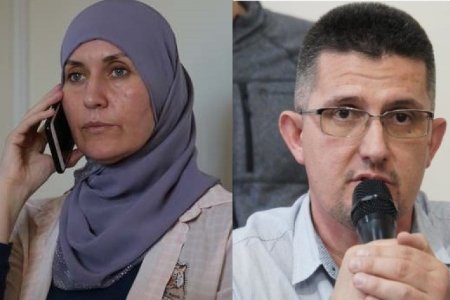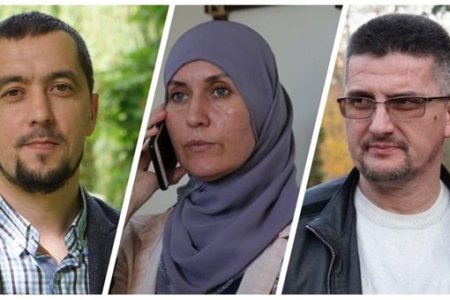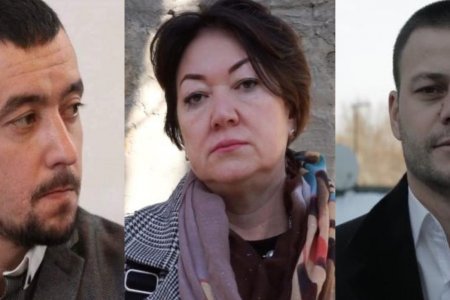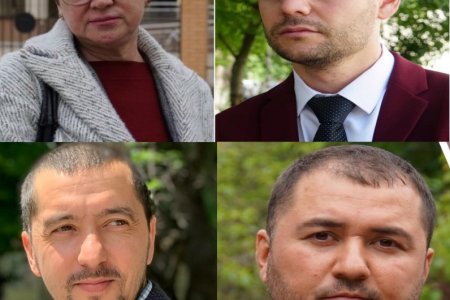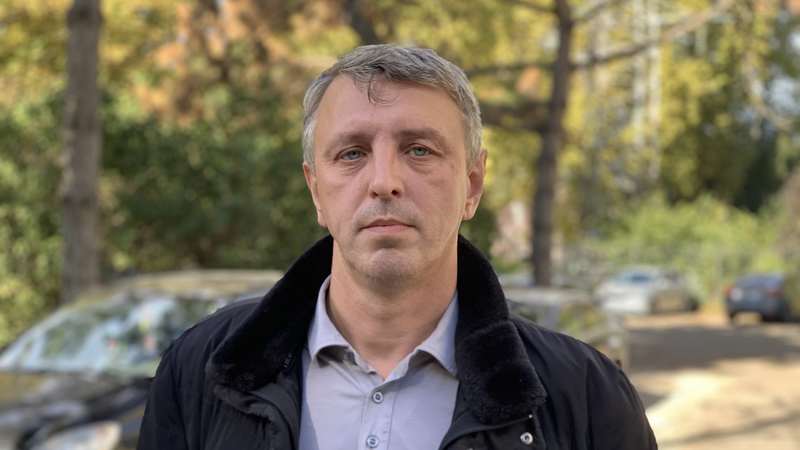
Alexei Ladin, a lawyer representing many of Russia’s Crimean Tatar and other Ukrainian political prisoners, was detained on 13 October, and then jailed for 14 days. Although Ladin’s arrest was almost certainly part of Russia’s offensive against courageous lawyers in occupied Crimea, the pretext was several Facebook pages, including, most shockingly, an image combining the trident, or Ukraine’s coat of arms and the Crimean Tatar tamga (part of the Crimean Tatar flag).
Ladin had just returned from Rostov, where he is representing Yaroslav Zhuk, a Ukrainian whom Russia abducted from occupied Melitopol and Ukrainian POW Pavlo Zaporozhets, and was planning to take part in another, almost certainly politically motivated detention hearing in occupied Simferopol. Instead, he was himself detained by officers from Russia’s so-called ‘centre for countering extremism’ who were awaiting his early morning train from Rostov. He was taken to his apartment in Sevastopol, where the officers carried out a search before taking him back to Simferopol, to the occupied ‘Kievsky district court’.
Graty reports that the two administrative protocols were drawn up by ant-‘extremism’ officer Roman Filatov. The first was under Article 20.3 § 1 of Russia’s code of administrative offences with ‘demonstrating symbols of a prohibited organization’.
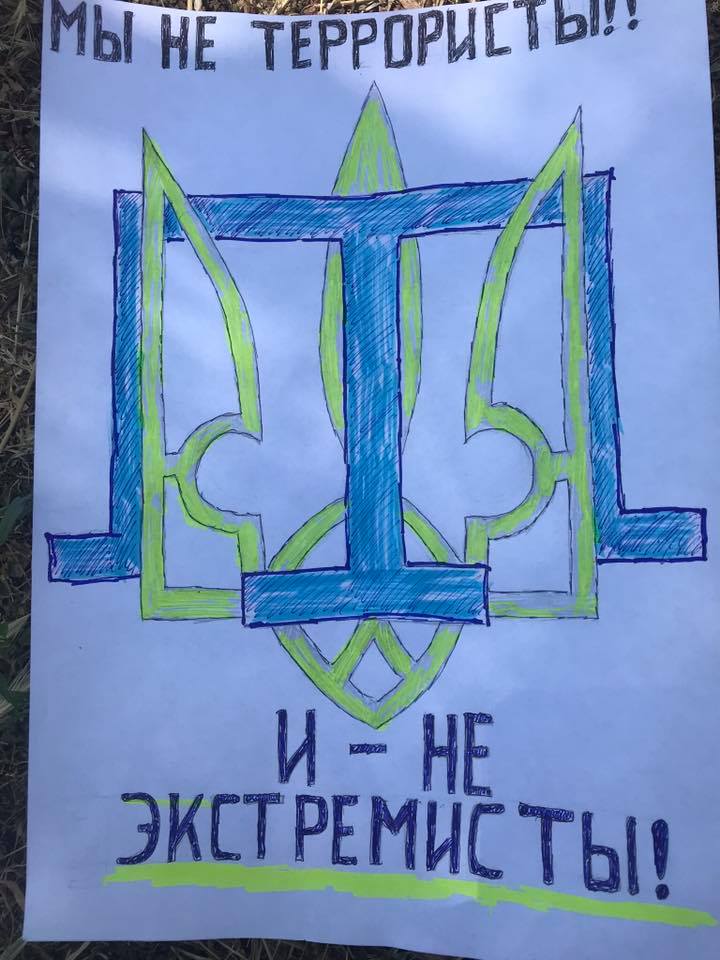
The symbol in question was from two Facebook posts in 2018, showing an image which Filatov claimed was a symbol of the Noman Çelebicihan Battalion, a peaceful, civilian organization which Russia’s supreme court quite unwarrantly declared ‘terrorist’ in June 2022. The image was nothing of the sort. It intertwined the national symbols of Ukraine and of the Crimean Tatar people, neither of which are ‘prohibited’ even by Russia. On one of these intertwined images, were the words WE ARE NOT TERRORISTS, and underneath AND NOT EXTREMISTS! The caption referred to Russia’s abuse of flawed ‘terrorism’ and ‘extremism’ legislation for its offensive against Crimean Tatars in revenge for their opposition to Russia’s invasion and annexation of Crimea. A second copy of the same image had the word ‘UNCONQUERED!’ in both Ukrainian and Crimean Tatar.
The images with captions were drawn, while he was imprisoned in 2018, by Crimean Tatar civic activist and political prisoner Ismail Ramazanov. He was tortured and then held in SIZO [remand prison] for around six months, before the charges (of ‘incitement to enmity’) were dropped (due to a small change in Russian legislation. It is telling that no attempt was made from then until October 2023 to claim that the image was linked to the Noman Çelebicihan Battalion, although Russia had begun using claims of involvement in the Battalion as pretext for political persecution from early in 2018. Ladin was at the time representing Ramazanov and first posted the image, saying that ‘we are not terrorists’, on his Facebook page, and then a link to the photo gallery of the images that Ramazonov was drawing in the SIZO, published by Crimean Realities.
The second charge was under Article 20.3.3 § 1 (of the same administrative code) which was pushed through ten days after Russia began its full-scale invasion of Ukraine. This punishes for anything claimed to ‘discredit the Russian armed forces’ and is used, together with other administrative and criminal charges, to silence protest and persecute those who speak out against Russia’s war of aggression and / or tell the truth about the war crimes Russia is committing.
The charge was over comments posted anonymously, although possibly from a lawyer in Moscow, about the war. This mentions that there “are again reports that Ukrainian cities are being bombed. The Ukrainian Armed Forces have caught the pilot of one of Putin’s bomber planes. He lies that he didn’t know what sites he was bombing. They show unexploded cluster munitions RS30 ‘Smerch’ and ‘Hurricane’, lying in the middle of Kharkiv. Their use is a war crime since they guarantee indiscriminate strikes in built-up city areas”. This was reposted by Alexei Ladin in March 2022, under the hashtag #НЕТВОЙНЕ [#No to the war].
Charges under Article 20.3.3 have been brought against Crimeans, merely for that hashtag, for Ukrainian patriotic songs or even the Ukrainian flag, while the Russian and occupation authorities have even used criminal charges against those who correctly report Russia’s bombing of civilian targets.
Ladin was brought before the occupation ‘Kievsky district court’ in Simferopol, with two separate ‘hearings’ before ‘judges’ Alexei Mikitiuk and Yekaterina Chumachenko. Despite the total fabrication behind the charge pertaining to images from 2018, Ladin was ‘found guilty’ and jailed for 14 days. He was also convicted over the anti-war repost and fined 45 thousand roubles.
The sentences will certainly be appealed by renowned human rights lawyer Emil Kurbedinov, who was representing Ladin. Such appeals, however, are virtually never successful, and the heavy-handed measures against Ladin on 13 October suggest that the objective was always to jail another of the courageous lawyers who are not afraid to defend the victims of Russia’s repression.
Emil Kurbedinov was the first to be imprisoned back in 2017 on absurd charges over a video posted before Russia’s annexation of Crimea. He has on a number of occasions since been detained or faced other forms of harassment. Edem Semedlyaev had also faced harassment earlier and was then, in November 2021, jailed on grotesque charges for 12 days (see Crimean Tatar lawyer jailed and fined for defending client and refusing to strip naked ). The offensive against lawyers has become ever more ferocious, and dirty, with three Crimean Tatar lawyers – Lilia Hemedzhy; her husband Rustem Kyamilev and Nazim Sheikhmambetov stripped of their licence in August 2022 (see: Russia strips three Crimean Tatar lawyers of their licence to prevent them defending political prisoners ).
All of these attacks, and that on 13 October against Alexei Ladin, are linked with the lawyers’ professional work and their commitment to properly defending the victims of political and religious persecution. They are also part of Russia’s mounting repression on occupied territory, with one of the aims clearly to deter other lawyers from representing political prisoners.
